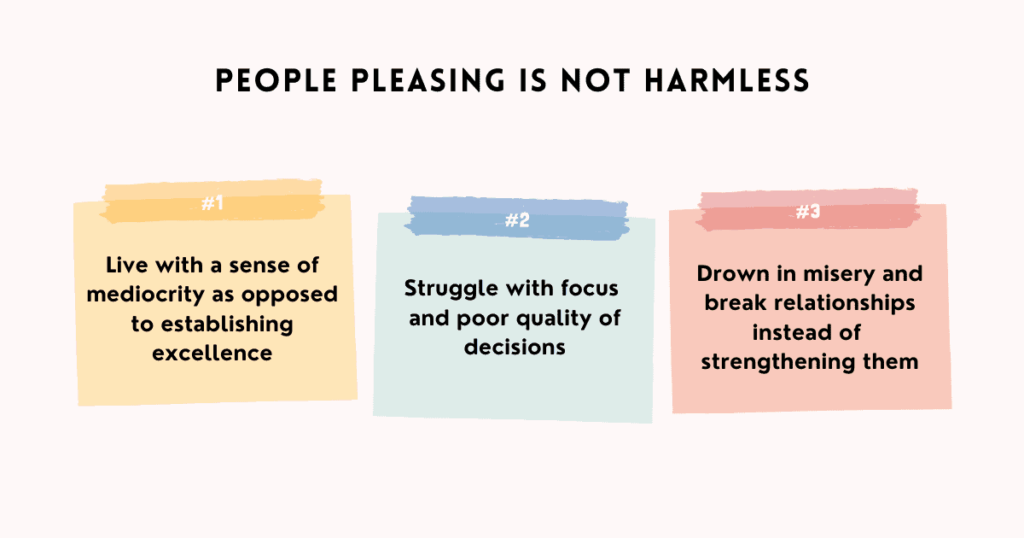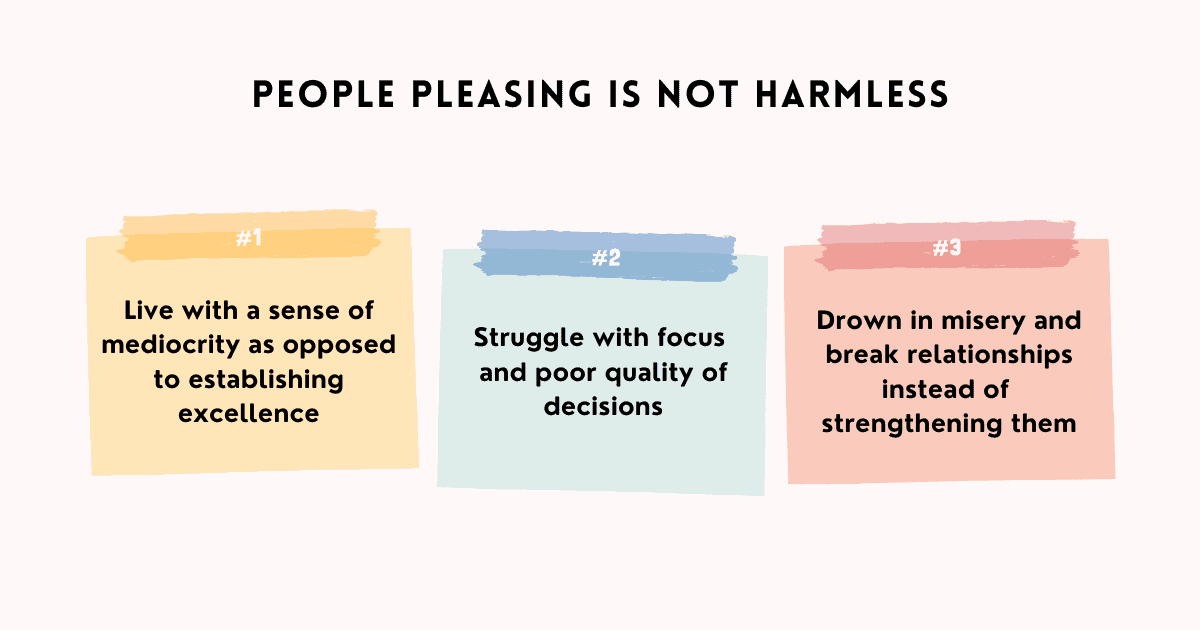
The Silent Burden: Unveiling the Negative Effects of People Pleasing
In a society that often prioritizes harmony and agreement, the desire to please others is a common human trait. While empathy and consideration are undoubtedly valuable, the relentless pursuit of approval, known as people pleasing, can lead to a cascade of negative consequences. This article delves into the profound negative effects of people pleasing, exploring how this ingrained behavior can erode self-worth, damage relationships, and ultimately hinder personal growth. Understanding these detrimental impacts is the first step toward breaking free from this cycle and cultivating a more authentic and fulfilling life. We will examine the psychological underpinnings of people pleasing, and provide practical strategies for setting boundaries and prioritizing your own well-being. The pervasive nature of people pleasing makes it crucial to understand its far-reaching implications.
The Erosion of Self-Worth
One of the most significant negative effects of people pleasing is the gradual erosion of self-worth. When individuals consistently prioritize the needs and desires of others above their own, they send a subtle but powerful message to themselves: that their own feelings and opinions are less important. This can manifest in several ways:
- Ignoring Personal Needs: People pleasers often neglect their own physical and emotional needs in an effort to accommodate others. This can lead to burnout, resentment, and a general feeling of being unfulfilled.
- Suppression of Emotions: To avoid conflict or disapproval, people pleasers may suppress their true emotions, leading to pent-up frustration and a disconnect from their authentic selves.
- Diminished Sense of Identity: Constantly adapting to the expectations of others can blur the lines of one’s own identity. Individuals may struggle to define their own values, interests, and goals, leading to a sense of emptiness and confusion.
The insidious nature of this erosion lies in its gradual progression. Over time, the constant self-sacrifice can lead to a deep-seated belief that one is not worthy of love, respect, or happiness unless they are constantly pleasing others. This can create a vicious cycle, where the individual seeks validation from external sources, further reinforcing the behavior.
Damaged Relationships
Paradoxically, while people pleasing is often motivated by a desire to maintain harmonious relationships, it can actually damage them in the long run. Authenticity is a cornerstone of healthy relationships, and when individuals are constantly trying to be someone they are not, it creates a foundation of dishonesty and mistrust. The negative effects of people pleasing in relationships can include:
- Resentment from Others: While initially, others may appreciate the willingness of the people pleaser to accommodate their needs, over time, they may begin to resent the lack of authenticity. They may perceive the behavior as manipulative or insincere, even if that is not the intention.
- Unrealistic Expectations: Consistently agreeing to every request sets unrealistic expectations for future interactions. When the people pleaser inevitably reaches their breaking point and is unable to fulfill a request, it can lead to disappointment and conflict.
- Lack of Reciprocity: Healthy relationships are built on mutual give-and-take. When one person is constantly giving and the other is constantly receiving, it creates an imbalance that can strain the relationship. The people pleasing behavior can actually discourage others from offering support or assistance, as they may assume that the individual is always willing to handle everything on their own.
Furthermore, people pleasing can prevent individuals from addressing important issues within the relationship. Fear of conflict may lead them to avoid difficult conversations, allowing problems to fester and ultimately damage the connection.
Hindered Personal Growth
Personal growth requires self-reflection, risk-taking, and a willingness to step outside of one’s comfort zone. The negative effects of people pleasing can stifle these essential elements, preventing individuals from reaching their full potential. This can manifest in the following ways:
- Fear of Failure: People pleasers often avoid taking risks because they are afraid of making mistakes or disappointing others. This fear can prevent them from pursuing their passions, trying new things, and learning from their experiences.
- Lack of Assertiveness: Standing up for oneself and expressing one’s needs is crucial for personal growth. People pleasers often struggle with assertiveness, allowing others to take advantage of them or dictate their choices.
- Missed Opportunities: The constant focus on pleasing others can distract individuals from pursuing their own goals and ambitions. They may miss out on opportunities that align with their values and interests because they are too busy trying to meet the expectations of others.
By prioritizing the needs of others, individuals may neglect their own intellectual, emotional, and spiritual development. This can lead to a sense of stagnation and a feeling of being trapped in a cycle of self-sacrifice.
The Psychological Underpinnings of People Pleasing
Understanding the root causes of people pleasing is essential for breaking free from this pattern. Several psychological factors can contribute to this behavior:
- Low Self-Esteem: Individuals with low self-esteem may believe that they are not worthy of love or acceptance unless they are constantly pleasing others.
- Fear of Abandonment: A deep-seated fear of being rejected or abandoned can drive individuals to go to great lengths to maintain relationships, even at the expense of their own well-being.
- Perfectionism: Perfectionists may believe that they must always be perfect in order to earn the approval of others. This can lead to a relentless pursuit of perfection and a constant fear of making mistakes.
- Past Trauma: Experiences of trauma, such as abuse or neglect, can create a pattern of people pleasing as a survival mechanism. Individuals may learn to suppress their own needs and feelings in order to avoid further harm.
Strategies for Breaking Free
Overcoming people pleasing requires a conscious effort to challenge ingrained beliefs and behaviors. Here are some practical strategies for setting boundaries and prioritizing your own well-being:
- Identify Your Values: Take time to reflect on your own values, interests, and goals. This will help you to define what is truly important to you and make decisions that align with your authentic self.
- Set Boundaries: Learn to say no to requests that you are not comfortable with or that would compromise your own well-being. Start with small requests and gradually work your way up to more challenging situations.
- Practice Self-Compassion: Be kind and understanding to yourself, especially when you make mistakes or struggle to assert your needs. Remember that it is okay to prioritize your own well-being.
- Challenge Negative Thoughts: Identify and challenge negative thoughts that contribute to people pleasing behavior. For example, if you catch yourself thinking, “I have to say yes to this request or they will be angry with me,” challenge that thought by asking yourself, “Is that really true? What is the worst that could happen?”
- Seek Support: Talk to a therapist, counselor, or trusted friend about your struggles with people pleasing. They can provide support, guidance, and accountability as you work to change your behavior.
The Path to Authenticity
Breaking free from people pleasing is not an easy process, but it is a worthwhile one. By prioritizing your own well-being, setting boundaries, and embracing your authentic self, you can cultivate healthier relationships, achieve your goals, and live a more fulfilling life. The journey towards authenticity is a journey towards self-discovery, self-acceptance, and ultimately, self-love. Recognizing the negative effects of people pleasing is the first crucial step on this path. [See also: How to Set Healthy Boundaries] [See also: The Importance of Self-Care]
Ultimately, understanding and addressing the negative effects of people pleasing is paramount for fostering genuine connections, achieving personal fulfillment, and living a life aligned with one’s true self. The journey might be challenging, but the rewards of authenticity are immeasurable.

